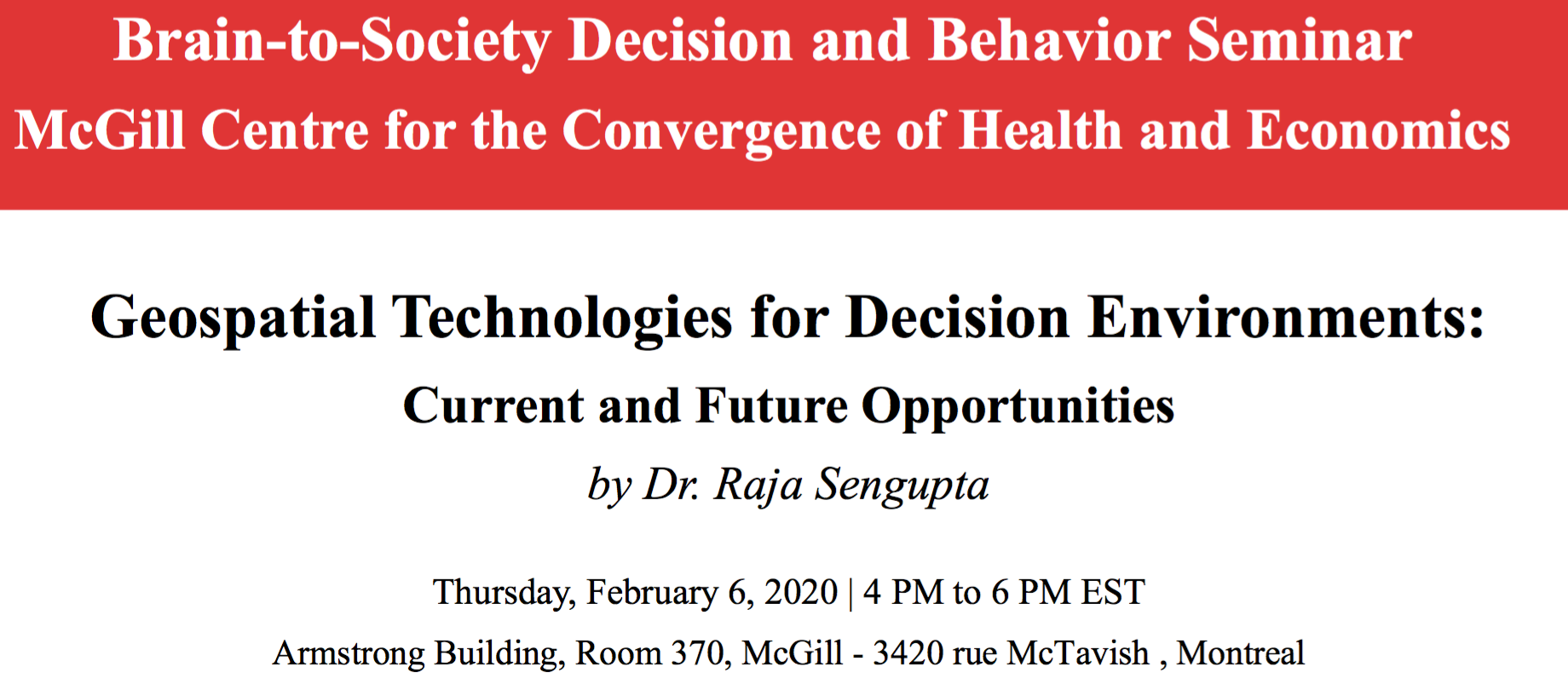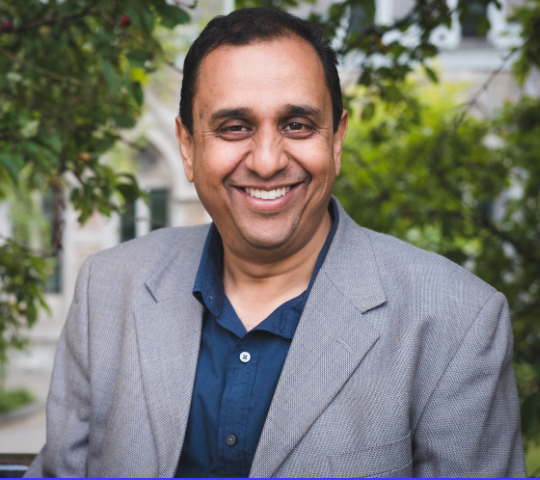
View the attached poster for a link and password to access this seminar remotely.
Seminar Abstract: This talk will cover the wide range of Geospatial technologies that exist to provide deci- sion support for health management, understanding human interactions with biodiversity, and to reduce human-animal conflicts in national parks in order to manage emerging infectious diseases. These technologies include Location Allocation modelling, Geographically Weighted Regressions, and Agent-Based Models. Overall, the talk will provide an overview of toolkits that can be used by decision-makers to look at problems with a spatial perspective, and understand the unique geospatial environments within which these decisions have to be made. In particular, human-environment interaction that occurs within this spatial framework is highlighted.
Panel Discussion: Following the seminar, there will be a panel of disciplinary scientists from neuroscience, management, economics, and computational sciences. The moderator is Prof. L. Dube, Chair and Scientific Di- rector, McGill Centre for the Convergence of Health and Economics (MCCHE).

Moderator: Laurette Dubé, initially trained as a nutritionist, also holds degrees in finances (MBA), marketing (MPS), and behavioral decision-making/consumer psychology (PhD). Dr. Dubé is Full Professor at the Desautels Faculty of Management, McGill University. Her research focuses on the study of affects, behavioral economics, and neurobehavioral processes underlying consumption, lifestyle, and health behav- ior. Her translational research examines how such knowledge can inspire effective interventions. She is also the founder and scientific director of the McGill Centre for the Convergence of Health and Economics, a unique initiative to push the boundaries of science to tackle societal and economic challenges and foster in- dividual and collective health and wealth.
Panelist: Andre Laperrière is executive director at the Global Open Data for Agriculture and Nutrition (GODAN), an initiative aiming to exchange ideas and knowledge to solve the world's looming food crisis.During his career Mr. Laperrière has led numerous large-scale projects on behalf of private corporations and also within the United Nations. He has extensive work experience in Africa, the Americas, Caribbean, Europe and Middle East, in particular in developing countries and in conflict and post-conflict environments. Mr La- perrière has held various senior management positions in the United Nations Common System, including Ex- ecutive Director in the International Criminal Court, Director of Administration and Finance Division in the World Health Organization and Oil for Food coordinator for UNICEF. Before joining GODAN, Mr. Laper- rière was Deputy CEO of the Global Environment Facility (GEF). Mr. Laperrière is an expert in international development. He holds a post graduate diploma in Administration and in Industrial Relations from Laval University.
Panelist: Dominic Schofield, Par tner & Managing Dir ector , Mother Food Inter national, has over twen- ty-five years of professional experience in the field of international development serving in leadership posi- tions with the private and not-for-profit sectors, and the United Nations with extensive experience based in Africa and Asia. Throughout, Dominic has sought to bring good development practice together with good business practice and he continues to advise governments and businesses on evidence-based policies and blended finance approaches that take innovations with social impact to scale. While based in Geneva, New York, Ottawa and Washington DC, his work in public health over the last 17 years has focused on addressing malnutrition in developing countries through global initiatives and multi-sectoral alliances that combine the
strengths of government, private sector, and civil society. Dominic is currently Founder and CEO of Peregrine Impact Associ- ates, providing strategy and management consulting services to philanthropies, UN and mission-driven businesses in the design and delivery of large-scale social impact initiatives advancing food and nutrition security in Low and Middle-Income Countries.
Panelist: Louise Potvin is currently professor at the Department of Social and Preventive Medicine, School of Public Health (ESPUM), Université de Montréal. She is the Director of the Centre de recherche en santé publique, Université de Montréal and CIUSSS Centre-Sud-de-l’Île-de-Montréal. She holds the Canada Research Chair in Community Approaches and Health Inequalities. Her main research interests are Popula- tion Health Intervention Research and the role of social environments in the local production of health and health equity. In addition to having edited and co-edited 8 books, she has published more than 300 peer-reviewed articles, book chapters, and editorials. She is a globally elected member of the Executive Board of the International Union for Health Promotion and Education and the Editor-in-Chief of the Canadian Journal of Public Health. She is a Fellow of the Canadian Academy of Health Sciences. She received the 2017 Pierre-Dansereau Award from the Association canadienne française pour l’avancement des sciences (ACFAS) and the 2019 Canadian Institute of Health Research - Institute of Public and Population Health Trailblazer Award in the Senior research category.
Panelist: Vincent Dugré, Member of the board of director of the TCI Network, is a cluster practition- er and co-founder of BIVIZIO, a tech company specialized in digitization of ecosystems, cities, clusters and networks. With 20 years of international experience, he was previously Vice President of Operations at the Quebec Ground Transportation Cluster and currently he collaborates with Canadian and international clus- ters, universities, research centres and governmental agencies. Among others, Vincent was a Member Steer- ing committee – Development of Quebec Mobility Cluster (Propulsion), and Co-designer and Cluster map- ping lead (NRC Proteins Asset Mapping for Protein Industries Canada Supercluster and McGill U.).